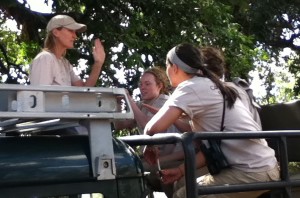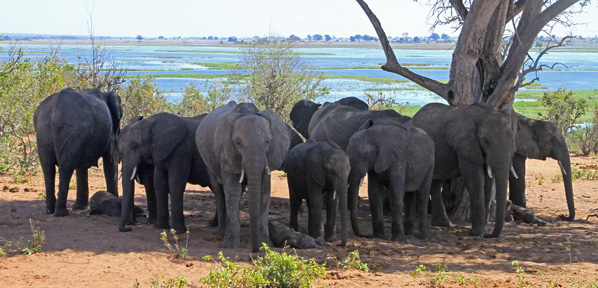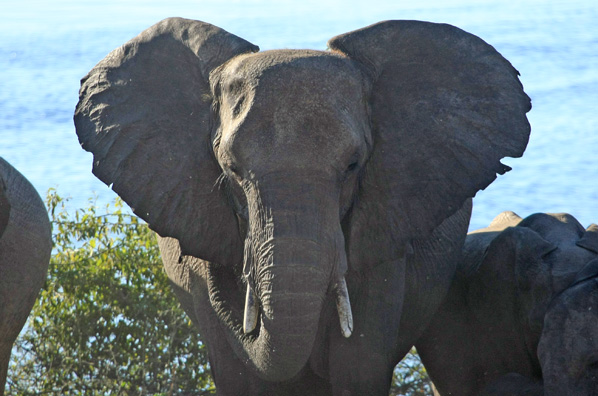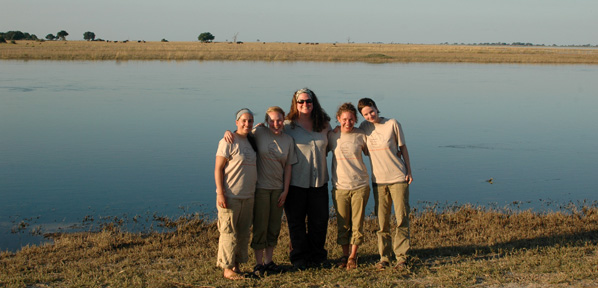Elephant Herd Assessments by Puget Sound Students
So there we were, sitting atop the Elephants Without Borders research Land Rover, sun beating down on our faces, surrounded by the buzz of bugs and calls of various birds, waiting in anticipation for our first elephant herd. Though we had been shown with paper diagrams how to age and sex the elephants according to their physical features, we were simultaneously eager and anxious to accurately survey the animals. It was only our second day in Kasane, and the four of us had just arrived in Botswana less than a week earlier, but the immensity of our experience and the novelty of our environment made us feel like we had been here much longer.
The four of us are undergraduate students from the University of Puget Sound (http://www.pugetsound.edu/) in Tacoma, Washington. We were given the opportunity to travel to Botswana and Namibia with Professor Rachel DeMotts, as a part of a newly established field school that aims to complement our classroom learning, in affiliation with the Environmental Policy and Decision-Making Department (http://www.pugetsound.edu/academics/departments-and-programs/undergraduate/environmental-policy/) We had the incredible fortune of spending one component of the field school with Kelly Landen, of EWB, assessing elephant herd structure and recruitment rate in Chobe National Park. This task consisted of long days driving through the park, and stopping to record the elephant herds as we encountered them on their journeys to and from the water. Our data collection included determining the ages and sexes of the individuals that comprised each group as well as recording the location and any unique features of specific elephants. This information will later be compared with the results of an aerial rapid elephant population assessment (REPAS) in order to determine the accuracy of ground assessments, which are more accessible to local communities. Additionally, data on age and sex ratios in herds will aid EWB’s ability to better comprehend elephant recruitment rates.
Despite classroom discussions and studies about elephants in the context of Northern Botswana and Namibia’s Caprivi region, we were surprised and pleasantly overwhelmed by the abundance of elephants and other species within Chobe. Though films and documentaries of Chobe and the surrounding areas often shape people’s perceptions of this environment abroad, they cannot do justice to the richness of the region’s biodiversity, in terms of both landscape and wildlife. It immediately became evident to us that elephants are an integral part of this ecosystem. Our brief experience with the elephants allowed us to truly appreciate the phrase “charismatic megafauna,” although it was clear that Kelly’s superior knowledge and understanding of their behavior was something that could only be achieved through time and dedication. Kelly’s intuition enhanced our experience in an invaluable way, allowing us to admire and interact with the elephants safely and unobtrusively, granting us a distinctive perspective.
At the end of our three days in Chobe, we had identified just under 450 elephants among over 40 herds. As we compiled the data we reflected upon the impressions we had garnered during our time spent with EWB. Our close and intimate proximity to the animals cemented our belief that wildlife conservation is an important prerogative, and one that we will continue to pursue. Moreover, Kelly’s intentional methodology and persistent respect for the elephants’ space taught us to prioritize the comfort of wildlife over data collection in the course of research. We cannot express our gratitude for what has truly been an inspirational and life-altering opportunity. Thank you to Professor DeMotts (http://www.pugetsound.edu/faculty-pages/rdemotts/) for making this all possible and especially to Kelly and EWB for taking the time to share your work with us!
Susin Olszewski, Sarah Webb, Alyssa Bruhn & Mikaela Freeman
Learn more about Elephants Without Borders at http://www.elephantswithoutborders.org/
Tags: africa, botswana, chobe, conservation, elephants, elephants without borders, research, University of Puget Sound, wildlife












Trackbacks/Pingbacks